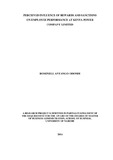| dc.description.abstract | Rewards and sanctions, as tools, can be used to convey the message that performance is important, and help to focus on specific aspects of performance that need to be improved. This is because employees as teams or as individuals whose job efforts are recognized and rewarded feel appreciated. Rewards can be either extrinsic or intrinsic whereas the primary purpose of a disciplinary system should be to correct. What motivates an employee‟s performance is if there are rewards that reinforce good performance or negative consequences for poor performance. This study sought to establish the perceived influence of rewards and sanctions on employee performance at Kenya Power Company Limited. The study used descriptive survey design; stratified random sampling technique was employed to select 1058 employees who participated in the study. Questionnaires were administered to the respondents. From the research, the researcher was able to determine the perceived influence of rewards and sanctions on employee performance at the Kenya Power Company. The study concluded that majority of the respondents were male, most of the employees were aged between 31-41 years, and that most of the employees had attained education up to university level. Further, the study concluded that majority of the employees had stayed in the company for a period of over 20 years. On the influence of rewards on the employees‟ performance, the study concluded that with an effective rewards system in place, employees are inspired to put extra effort in their work. The study also concluded that the rewards and recognition scheme in the organization is solely implemented based on employee performance and that a rewards system that is tied to individual performance results in higher productivity for the company. On the influence of sanctions on employee performance, the study concluded that lack of immediate disciplinary action impacts negatively on employees‟ performance and that sanction should be affected only after more positive teaching or training has failed to achieve the desired results in the respective employee‟s performance. The study recommends that the organization should focus on linking individual performance with organizational performance and goals and that it is important to ensure that training needs or skills gaps identified from employees are addressed in a timely manner and feedback is given to improve job performance. The study suggests that further research be done on challenges facing effective implementation of rewards and sanctions management in corporate organizations. Research could also be undertaken on measures for ensuring an effective monitoring and evaluation system of the rewards and sanctions system is in place | en_US |

